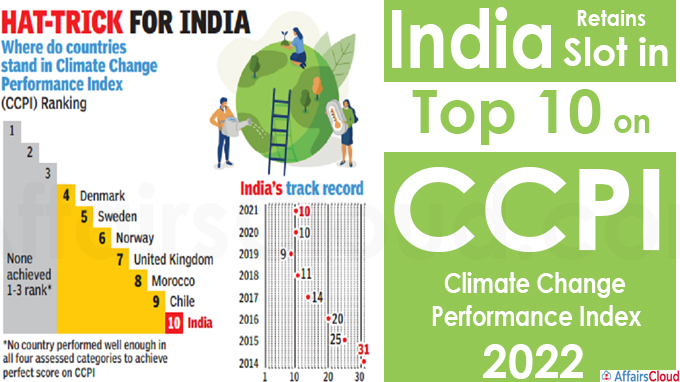CLIMATE CHANGE PERFORMANCE INDEX 2022
The climate crisis is an existential threat to life on Earth. To reduce the magnitude of the crisis’ impacts, we must limit global warming to 1.5°C, as decided in the Paris Agreement.
The Climate Change Performance Index (CCPI) is a scoring system designed by the German environmental and development organisation Germanwatch e.V. to enhance transparency in international climate politics. On the basis of standardised criteria, the index evaluates and compares the climate protection performance of 63 countries and the European Union (EU) (status CCPI 2022), which are together responsible for more than 90% of global greenhouse gas (GHG) emissions.
FIRST RELEASE
The Climate Change Performance Index was first published in 2005 and an updated version is presented at the UN Climate Change Conference annually.
AIM
It aims to enhance transparency in international climate politics and enables comparison of climate protection efforts and progress made by individual countries.
METHODOLOGY
an independent monitoring tool, the CCPI has a leading role in informing on the Paris Agreement’s implementation phase.Since 2005, the CCPI has provided analysis of countries’ climate protection performance.
The national performances are assessed based on 14 indicators in the following four categories:
1. GHG emissions (weighting 40%)
2. Renewable energy (weighting 20%)
3. Energy use (weighting 20%)
4. Climate policy (weighting 20%)
The three categories "GHG emissions," "renewable energy" and "energy use" are each defined by four equally weighted indicators:
(1) current level,
(2) recent developments (5-year trend),
(3) 2°C compatibility of the current performance, and
(4) 2°C compatibility of 2030 target.
These 12 indicators are complemented by two indicators, measuring the country's performance regarding its national climate policy framework and implementation as well as regarding international climate diplomacy in the category "climate policy."
The data for the "climate policy" category is assessed annually in a comprehensive research study. . The results are rated as very high, high, medium, low, or very low.
CLIMATE CHANGE PERFORMANCE INDEX RESULT
No countries ranked in the top three overall positions
The climate protection performance of those countries, which together account for 92% of global greenhouse gas (GHG) emissions, is assessed in four categories:
GHG emissions,
renewable energy,
energy use, and
climate policy.
No country performs well enough in all index categories to achieve an overall very high rating in the CCPI. So, the top three places in the overall ranking remain empty.
Denmark is the highest-ranked country in CCPI 2022, followed by With the United Kingdom (7th), India (10th), Germany (13th), and France (17th), four G20 countries are among the high-performing countries in CCPI 2022.
India grabbed the 10th position this year.
TOP 20 COUNTRIES WITH THEIR SCORE
Rank Country Score
1 - -
2 - -
3 - -
4 Denmark 76.67
5 Sweden 74.22
6 Norway 73.29
7 United Kingdom 73.09
8 Morocco 71.60
9 Chile 69.51
10 India 69.20
11 Lithuania 64.89
12 Malta 64.18
13 Germany 63.53
14 Finland 62.41
15 Switzerland 61.70
16 Portugal 61.11
17 France 61.01
18 Luxembourg 60.80
19 Netherlands 60.44
20 Ukraine 60.40
BOTTOM 5 COUNTRIES
- Australia 30.06
- Korea 26.74
- Canada 26.03
- Islamic Republic of Iran 25.66
- Saudi Arabia 24.25
- Kazakhstan 19.23
Climate Change Performance Index 2021
Rank Country Score
1 (None achieved 1-3 rank)
2
3
4 Sweden 74.42
5 United Kingdom 69.66
6 Denmark 69.42
7 Morocco 67.59
8 Norway 64.45
9 Chile 64.05
10 India 63.98
Climate Change Performance Index 2022
India
India has grabbed in the top 10 best performing countries for the third year in a row.
India’s performance was rated high in the GHG Emissions, Energy Use, and Climate Policy categories, and medium in Renewable Energy.
The report pointed out that India maintained a strong performance like last year. It rated the performance of India ‘high’ in the greenhouse gas (GHG) emissions, energy use, and climate policy categories.
Of the 18 countries, France, China, the United Kingdom, and India earned a high rating in the Climate Policy category.
The pipeline of proposed coal power plants is the world’s second-largest and one of the few that has increased since 2015.
The report finds that India is already on track to meet its 2030 emissions target —which is compatible with a well below the 2°C scenario— close to achieving its Nationally Determined Contribution (NDC) target of a 40% share for non-fossil fuel installed power capacity by 2030, and on course for a targeted 33 to 35% reduction in energy intensity by the same year.
The report also stresses India’s ambitious renewable energy policies, such as its targets of renewable electricity capacity of 450 GW and a 30% electric vehicle share by 2030.
Although India receives an overall high performance, the report argues that it should set an explicit net zero target for 2050 and leverage its domestic success on renewables and emissions intensity into international initiatives.
the recently concluded COP26 Summit, Prime Minister Narendra Modi had said that India aims to become a net-zero economy by 2070 and has set a target of installing a non-fossil energy capacity of 500 GW by 2030.













0 Comments